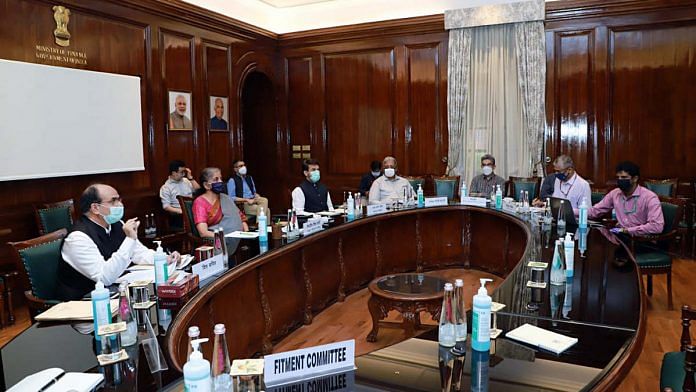New Delhi: A day after a meeting of the Goods and Services Tax Council remained inconclusive on the issue of borrowing to meet the shortfall in GST compensation to the states, the Narendra Modi government Tuesday gave permission to 20 states to borrow from the markets.
The government’s move is likely to further strain its relations with opposition-ruled states who have been against this move, and raise questions over the jurisdiction of the GST Council.
In a statement, the finance ministry said the expenditure department has granted permission to 20 states to raise an additional amount of Rs 68,825 crore through open market borrowings. These are states that agreed with the option given by the Centre to borrow Rs 1.1 lakh crore (all states combined) to meet the shortfall in revenues.
The government will facilitate a special borrowing window for the 20 states to borrow from the market. The entire principal and interest will be repaid out of the future compensation cess collections.
The states that have agreed to borrow include Andhra Pradesh, Maharashtra, Odisha, and the likes of Bihar, Madhya Pradesh, Uttar Pradesh Gujarat and Karnataka, which the BJP rules solo or in alliance.
The states opposing the Centre’s insistence that the states do the borrowing include Kerala, West Bengal, Tamil Nadu and Punjab, most of which are ruled by opposition parties.
Also read: GST compensation cess less than one-fifth of total shortfall, Maharashtra among worst hit
Aftermath of Monday’s meeting
After the GST Council meet Monday, Finance Minister Nirmala Sitharaman had indicated that the Centre will facilitate borrowings by states. She had also questioned if the GST Council has powers to decide if any state can borrow from the markets, and pointed out that borrowing by states is governed by article 293 of the Constitution.
However, reacting to Sitharaman’s comments, Kerala Finance Minister Thomas Isaac had termed the Centre’s move “illegal”, and said the GST Council was yet to agree for a deferrment of the GST compensation payment to future years.
Union FM’s announcement that she is going to permit 21 states to borrow as per Option one is illegal. Option one involves deferment of compensation payment beyond 5 years for which a Council decision is necessary as per AG’s opinion. No such decision has been made in the Council
— Thomas Isaac (@drthomasisaac) October 12, 2020
Chhattisgarh Finance Minister T.S. Singh Deo had also advocated that the central government should borrow, and criticised its proposal.
“Amid such critical conditions when the state govts need a helping hand from central govt, it is not only withholding the resources but also suggesting unacceptable methods to provide compensation,” Deo tweeted Tuesday.
Amid such critical conditions when the state govts need a helping hand from Central govt, it is not only withholding the resources but also suggesting unacceptable methods to provide compensation. (4/4)
— TS Singh Deo (@TS_SinghDeo) October 13, 2020
Later, reacting to the finance ministry statement, Deo said the government has “let down the states in this hour of need and has failed to perform its solemn constitutional and legal obligations”.
Everyone who respects our federal structure should come together & stand with rights of the state to receive their Constitutional & Legal dues. The Central Govt has let down the States in this hour of need and has failed to perform it's solemn Constitutional and Legal Obligations https://t.co/16ewx58ss3
— TS Singh Deo (@TS_SinghDeo) October 13, 2020
Why there is a problem
There has been a massive shortfall in GST compensation cess collections due to the economic slowdown as well as the Covid pandemic, so the Centre has been unable to compensate the states like it usually does, from the compensation cess fund.
It put two options before the states, and most of them opted for the one that involved borrowing Rs 1.1 lakh crore combined in the current fiscal to meet the compensation shortfall. The remaining shortfall, it proposed, would be paid to the states over the next few years from collection of the cess, whose term has been extended beyond 2022.
This was agreed to by a majority of the states. However, many opposition-ruled states favoured that the central government should borrow and not the states. They also opposed any distinction in the GST shortfall on the basis of Covid and non-Covid factors.
GST compensation cess is levied over and above the highest tax slab of 28 per cent, on so-called sin/luxury goods like tobacco, luxury cars and aerated drinks.
M. Govinda Rao, member of the Fourteenth Finance Commission and former director of the National Institute of Public Finance and Policy, said the central government’s actions will have long-term consequences, besides the fact that many of the states could decide to take the central government to court.
“It will damage the fabric of Union-state relations. There was so much camaraderie in the GST Council and no decision was taken along party lines. In the future, whenever there is a serious problem, there is a risk that decision will be taken along party lines,” he said.
Also read: Centre vs states GST row doesn’t matter. What matters is reviving economy & a borrowing plan



